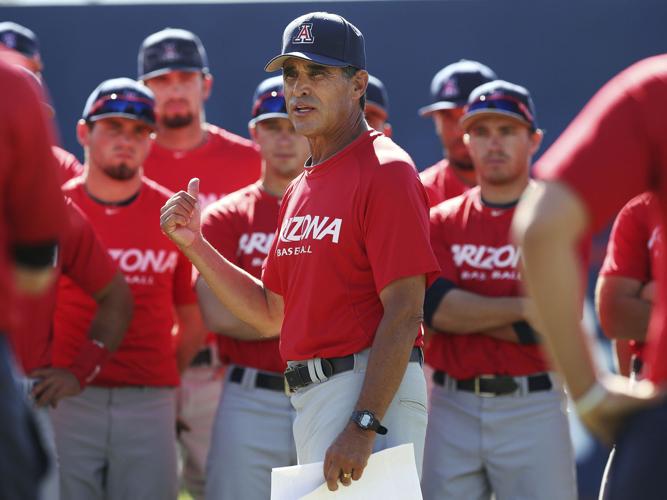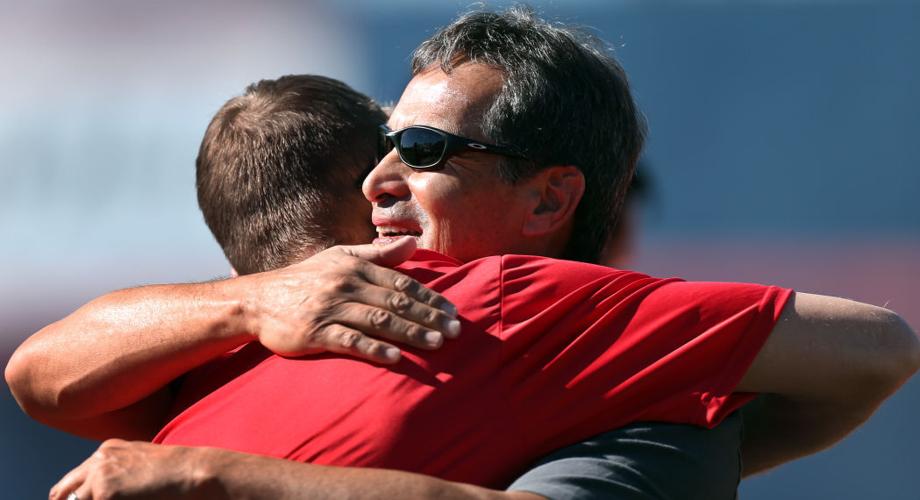Former Arizona Wildcats coach Andy Lopez is about to receive one of the biggest honors of his life — induction into the American Baseball Coaches Association Hall of Fame on Friday. Yet Lopez described the occasion as “bittersweet.”
That’s because Lopez won’t be able to attend the funeral of friend and mentor Jerry Kindall, who died Christmas Eve. Kindall’s funeral is Thursday afternoon in Tucson; Lopez’s obligations with the ABCA in Indianapolis forced him to leave town Thursday morning.
Then again, Kindall likely would have wanted it this way.
“Coach would probably be upset with me for missing the convention if I didn’t go,” Lopez said, laughing.
Lopez, who led the Wildcats to the College World Series championship in 2012 and retired after the 2015 season, reports that he’s in good health. The 64-year-old spends two days a week serving as a mentor at the Southern Arizona Community Academy. He works as an analyst for Pac-12 Networks during the college baseball season. Otherwise, he spends time reading the Bible and hanging out with wife Linda and their four adult children: Kristi, Kerri, Michael and David.
Lopez spoke with the Star this week about his storied career — which includes two national championships (one at Pepperdine) and 490 wins over 14 seasons at Arizona – as well as his relationship with Kindall. Here is a portion of that conversation:
How did you first get to know Coach Kindall?
A: “I admired his program, and I admired him as a coach and the way they went about it in the ’70s. We (UCLA) played them in ’75 and ’76, my last two years. I just liked the way they went about it. They played hard. They were classy in the dugout. They didn’t do a bunch of stupid things. I just really admired the way he did it. And they beat us.
“Then in 1983 I become the baseball coach at Cal State Dominguez Hills, and I go to the (ABCA) convention. I went to the Fellowship of Christian Athletes breakfast. I introduced myself. As only Jerry Kindall can do, he made me feel so welcome. ‘I remember you as a player, Andy.’ So on and so forth. He probably didn’t. But that’s just the way Coach was. I said, Coach, ‘I’m at Cal State Dominguez Hills. If there’s any way I can get on your schedule …’ and before I could finish the sentence, ‘just call me.’ Look at the records. We were on Arizona’s schedule every year from 1984 to 1993. We’d come here every year. So our friendship started.
“Coach Kindall was a tremendous influence on me. Not only a tremendous mentor but a dear friend. I miss him a lot. This weekend is going to be bittersweet for me. I’m obviously very humbled, very thankful, but man, oh man.”
You went from Dominguez Hills to Pepperdine, from Pepperdine to Florida. How did the Arizona opportunity come about?
A: “In 1996 I was contacted by someone at the University of Arizona. I was in Omaha at the time with Florida. It was my second year. While I was there, the rumor was out that Coach Kindall was going to retire. I got back to Gainesville. Had a conversation with (former Arizona athletic director) Jim Livengood and basically said, ‘We just got here.’ It was my second year at Florida. ‘I can’t. I’m honored. But I can’t.’ Coach (Jerry) Stitt deserved that job. I’m sure they were just seeing, ‘Is there any interest?’
“I was so honored. Maybe one day down the road I’d love to be considered again, because that’s a special place, and a special job. For me it was special because of Jerry Kindall. I didn’t know Tucson except as an opponent. In the ’80s, I coached third base. The fans at Arizona were good at making sure you knew (they were there). It was my (second) year at Cal State Dominguez Hills. We were facing Joe Magrane. I think we were losing 12-1. And some guy from the left-field bleachers yells out, ‘Hey, Andy, I see you have 35 career wins! Thirty-five!’ Then he’s reading Jerry Kindall’s numbers. I knew Coach Kindall. I knew what he represented. I knew what the program represented. I was always very much an admirer of it.
“And then in 2001 I was offered the job, and I jumped.”
So you end up at Arizona. Was there a certain point when you felt like you really got things going?
A: “There was work to be done. In our third year, we went to the College World Series. I was contacted by some people at UCLA about the UCLA job in 2004. There were a lot of rumors out there that I was done, that it was a done deal, that I already had my house up for sale and I was looking for homes in Los Angeles.
“Once again my wife, who in the ’80s told me to stay in the profession, she looked at me and said, ‘Do you think you can win a national championship here in Tucson?’ I said yes. And she says, ‘Then why do we have to move? The girls are in high school. The boys love it here. I love Tucson. You’re happy in Tucson. Why can’t you do what you think you can do here?’ And man, am I thankful for listening to that beautiful woman of mine. So I stayed, obviously.
“I got the job on July 18, 2001. The first year we pretty much inherited who we had. The second year we recruited, and it was a marvelous group of young guys. We went to a regional, and the next year we went to Omaha. I feel like I failed here because we should have won more than one. In 2008, we should have won a national championship here. We had the pitching to win a national title – no ifs, ands or buts.”
You finally won the College World Series in 2012. Going into that season, or at some point during it, did you have a feeling that this could be the team?
A: “We were ranked pretty high. I thought we were very good, and I think the record proves it. Undefeated, 10-0 in postseason, never trailing in the College World Series. That’s a pretty special group. But I didn’t think we had the respect of a lot of people nationally.
“Stanford came here to Tucson. And they were pretty good. They were nationally ranked. Close game on Friday — we won (8-7). Beat them pretty soundly on Saturday (4-2). And really took it to them on Sunday (6-2). So we swept Stanford.
“Our family’s routine, we’d go to the Claim Jumper (after games). Then my wife and I would drive home together. As we were driving home that (Sunday) night, she said ‘Wow, that was a good weekend.’ And I looked at her and said, ‘You know what, Linda? If I don’t mess these guys up, we’re going to be pretty good in the postseason.’
“I have said this forever: When your best players are also your best human beings … in 38 years as a head coach, there were times when my best human beings weren’t my best players. Great human beings, but there weren’t my 3-4-5 (hitters), Friday-night or closer-type guys. When your best players are also your best human beings, man, you’ve really gotta do some bad things to mess it up.
“I felt, deep inside, that that group was going to be pretty special after that series against Stanford. They’re going to be a handful for somebody.”





